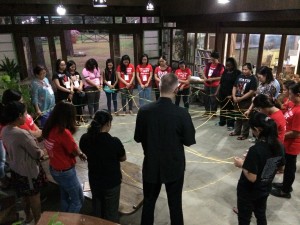“Women are strong enough to alleviate discrimination, stigma, oppression permanently. They just needed to be empowered and educated on their rights.” “Jesus revolutionized the role of women even during a time of acute patriarchy. It is refreshing to know that He is on the side of suffering women all along.” (Participants in the San Pablo Workshop)
For as long as I have been working with HIV I have worked with two groups in particular, INERELA+ (The International network of religious leaders living with or personally affected by HIV), and EHAIA (The World Council of Churches Ecumenical HIV and AIDS Initiatives and Advocacy). Both initiatives have been seeking to address HIV from a faith perspective. INERELA+ and EHAIA have long collaborated in the work they have both been doing in Africa, and from this perspective it only seemed natural that as EHAIA expanded their focus beyond Africa, a key partner would be INERELA+.
Key aspects of engaging on HIV are both the accurate information about HIV, (prevention, treatment, care and support) addressing the stigma and discrimination as well as identifying and addressing the very specific vulnerabilities to HIV. More often than not these vulnerabilities run along the fault lines of exclusion and marginalization. Faith communities are not immuned from this, rather the pervasive patriarchal power structures and teaching within Christianity and other faiths feed into this paradigm.
It has been the incredible work EHAIA has been doing over the past almost 15 years that initially lead churches in regions of the world other than Africa to first call on EHAIA to share their methodologies and teaching, their capacity building and accompaniment there as well. Following the endorsement of this enlarged vision by the WCC General Assembly in Busan in 2013, the Philippines was identified as one of the countries which would be used as pilot for this expanding ecumenical initiative.
Working closely with local member churches of the WCC through the National Council of Churches in the Philippines (NCCP), EHAIA and INERELA+ joined forces to use two highly respected methodologies in building the capacity of 27 women in a three day workshop held in San Pablo, south of the capital Manila. SAVE was developed by INERELA+ in an attempt to deal both with comprehensive all information needed for effective prevention of HIV transmission, but also to understand and challenge the roots of the stigma, shame, denial, discrimination, inaction and misaction (SSDDIM) associated with HIV. “In response to the continuing rapid spread of HIV and AIDS in the Philippines, the NCCP HIV and AIDS program together with the Women’s Desk continue to provide opportunities and spaces for comprehensive education and training to equip our churches in addressing this alarming issue,” said Ms. Darlene Marquez-Caramanzana, program secretary on Ecumenical Education and Nurture of NCCP.
The Contextual Bible Study model, taught in this workshop, was first developed by Ujamaa as an initiative from the University of KwaZulu-Natal. Significant work in this regard was then done by EHAIA and the development of the Tamar Campaign in collaboration with the Circle of Concerned African Women Theologians assisted in developing material that could be used to address sexual and gender based violence from within the faith community.
The workshop with 27 women in San Pablo proved an ideal opportunity to not only challenge women religious leaders on HIV, but to deal holistically with the many facets related to vulnerability. Through the clear and concise facilitation of the Contextual Bible Studies Rev. Pauline Njiru was able to highlight the way in which women in the bible have not only stood up to the powers of their time, but received strong endorsement from Jesus to be authentically who they are. Even though Tamar was raped by her brother, she did not keep quiet about it; even though the Samaritan women at the well was self-stigmatized, she engages with Jesus and Jesus engages with her; even though the disciples encourage Jesus to send away the women who is anointing his feet, Jesus praises her and gives her example of service to be something to be remembered every time He is remembered. Women are a key part of Jesus ministry, and without their ministry His ministry is vastly diminished.
Equally the content related to HIV was presented through the SAVE Toolkit in a way that allowed the participants to actively engage and identify HIV as an area of personal engagement rather than just a focus of ministry. Highlighting the key role of faith in propagate HIV related stigma allowed participants to see the areas where their own engagement could lead the church to be more empowering. What is clear is that bringing the two disciplines, the two methodologies together strengthened the content and impact of the workshop. In the post workshop wrap up session participant after participant not only spoke about the way in which they had been personally challenged and touched, but about the commitment they wanted to make to the group to further this work in a number of key areas.
At the workshop’s conclusion, Rev. Kadile said that “I can promote men and women to test for HIV. I can be more compassionate and understanding with people living with HIV and influence my organization to do the same. For youth organizations, I can educate them about being protected and to not discriminate PLHIV. I want to be partners with NCCP in promoting and advancing the cause for #PreventionNOTCondemnation.”
The collaboration between NCCP, EHAIA and INERELA+ has strongly impacted these 27 women, and through them the congregations and communities they work closely with. NCCP’s careful identification of the participants met that maximum impact form this workshop can be achieved. In a country UNAIDS indicates has the highest HIV incidents internationally, the role of faith communities will be critical to slowing and eventually stopping the further growth of HIV in the country. And these 27 women will form a key component in that engagement.

Lämna ett svar